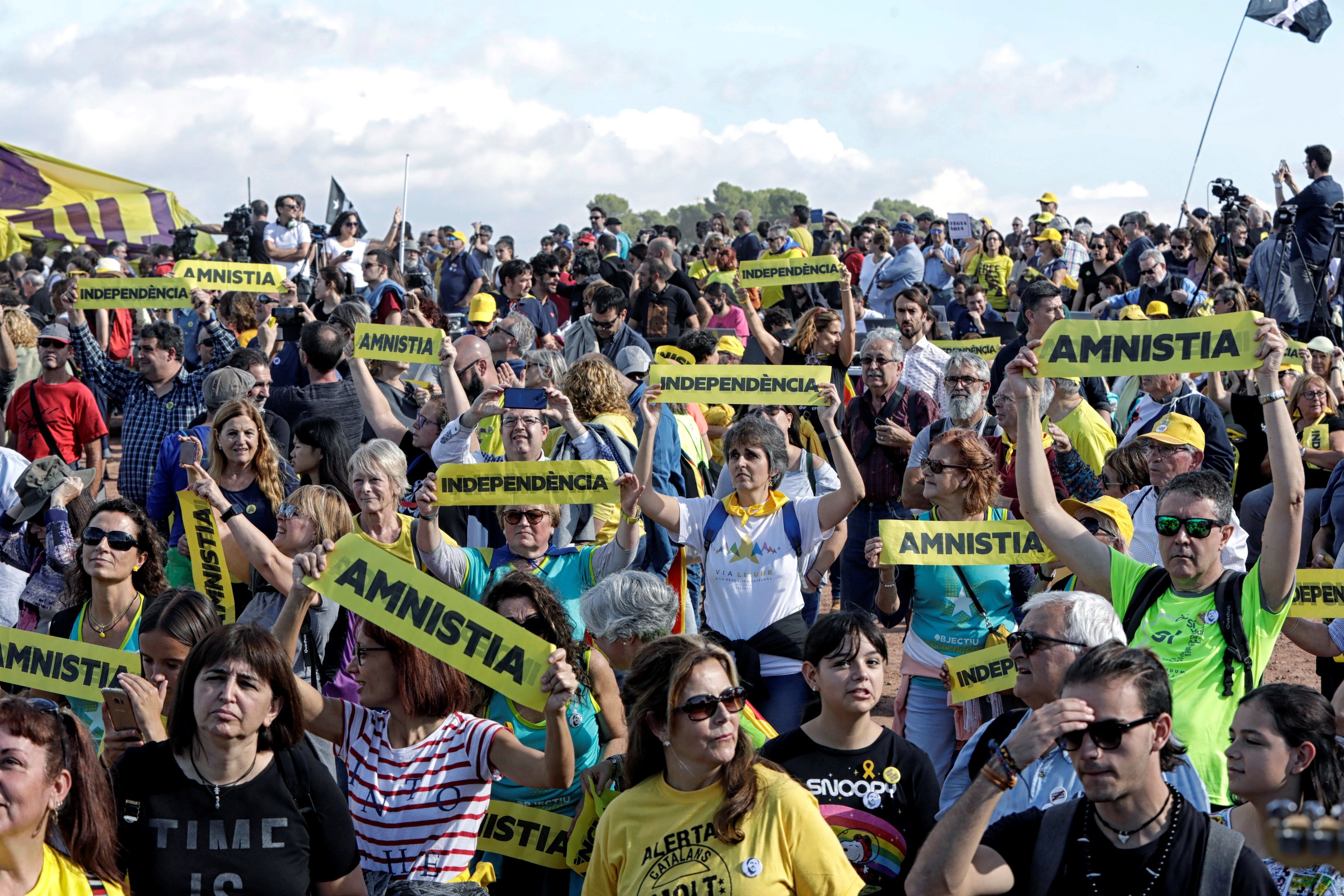The Future of the Spanish Government Faced with Catalan Separatism

Since it first came to power in June 2018, the Sánchez government has depended on the ERC. Consecutive early elections in April and November 2019 only affirmed this situation but also escalated tensions between PSOE and ERC and strengthened right-wing opposition. In the new congress of deputies, the PSOE-UP coalition has only 155 of 350 seats while 89 MPs represent the centre-right Popular Party (PP), 52 the conservative Vox, 10 the liberal Ciudadanos (Cs), and two the left-wing Más Pais. Regional parties won 42 seats, among them Catalan separatists from the ERC (13 seats) and Together for Catalonia (JxCAT, 8 seats).
Constitutional Conditions
To form a government, there is a need for either an absolute majority with a confidence vote or for a simple majority in subsequent votes. To achieve this, PSOE needs UP votes and the abstention of 41 MPs of other parties. If the government is not established within two months of the first confidence vote, early elections will be called (the fourth since 2016). The constitutional strictures help PSOE to maintain power, assuring the government it can be dismissed only by a constructive vote of no-confidence. Moreover, the failure to adopt a state budget for the next year results in the automatic establishment of a provisional budget based on the previous year’s budget. As a consequence, parliamentary fragmentation means dismissing a government is difficult and it can survive even without establishing a new budget. However, a minority government can’t provide active fiscal and finance policy.
Catalan Separatist Situation
The ERC’s leaders are aware that PSOE and UP are the only nationwide parties open to dialogue with them. PP, Vox, and Cs advocate for the abolition of regional autonomy or even the delegalisation of separatist parties. However, the ERC’s influence on the new government will weaken after its establishment and will be limited to the more difficult parliamentary process. Moreover, the ERC doesn’t trust Sánchez because of his confrontational attitude towards the Catalan government (Generalitat) during the campaign. He excluded the possibility of amnesty for the organisers of what Spain considers the illegal independence referendum in 2017, among them, ERC leader Oriol Junqueras. He also has demanded that Generalitat President Quim Torra condemn separatist demonstrators’ attacks on police and opponents of secession. The problematic issue is a royal digital decree issued at the request of the government that permits it to disable websites and block servers without court permission. It is a tool Spain is using to prevent the Generalitat from exploiting 5G technology tests in Barcelona to establish a virtual “digital republic of Catalonia”. As a result of the competition for separatist voters and disillusionment with the lack of effects of the dialogue between Torra and Sánchez since June 2018, the ERC’s regional coalition partner, JxCAT, has become more confrontational towards the PSOE-UP government than the ERC. It excludes supporting the coalition, proposes the organisation of another (illegal) independence referendum in Catalonia and conditions the recognition of the result of negotiations between the central and Catalan governments on the participation of an international mediator.
The ERC’s Negotiating Position
The ERC demands roundtable talks between the central and regional government to work out a solution to the political crisis. They expect the negotiations to consider amnesty for Catalan separatist activists and the organisation of a legal independence referendum. The ERC proposes recognition of the Generalitat as equal to the Spanish government, a commitment by the central government to conclude an agreement within a precise timeframe, and to present (as yet unspecified) guaranties for implementing the talks’ findings. The negotiations probably also will include a requirement for cooperation between PSOE and ERC in adopting state and Catalan budgets. Because of the mutual block on the budgets, the valid provisional budgets in Spain (since 2018) and Catalonia (since 2017) are still in place, preventing either party from implementing their election promises.
Determinants of the New Government
In case of disagreement between the ERC and the Socialists, they would have to solicit support from PP or Cs. Cooperation with these parties would require PSOE to withdraw key proposals: labour law reform, increased social benefits, and the federalisation of Spain. Therefore, an agreement between the Socialists and centre-right would be difficult for their voters, trade unions, and UP to accept. Fearing the consequences of such a scenario, trade union leaders have held meetings with Sánchez, Junqueras, and Iglesias for months. At the same time, UP is mediating between PSOE and the ERC. The support for a coalition comprised of some regional parties depends on an agreement with ERC as well. Also, the European Commission expects Spain to establish a new government. On 16 November, it appealed for the central authorities to accelerate work on a state budget for 2020 and to reduce the budget deficit from 2% to 0.9% of GDP.
PSOE’s Negotiating Position
The Socialists declare they are ready for a dialogue on the issues of amnesty and improving Catalan autonomy, a solution supported by over 50% of the region’s inhabitants. However, further increasing Catalan autonomy will be difficult because of its existing far-reaching scope (regional police, the management of more than 50% of regional tax revenues, EU funds and subventions, the supervision of regional media; and social, cultural and sports associations). However, PSOE has ruled out talk about an independence referendum in Catalonia as too risky for Spain. It’s the richest region in the country and generates about 19% of Spain’s GDP and nets €10 billion annually for the national budget. Despite that, from June 2018 to October 2019, the support for secession decreased (from 48.7% to 41.9%) while objection to it has increased (from 41.4% to 48.8%); thus, potential referendum results remain uncertain. Even so, despite being against Catalan independence, the UP advocates organising a legal referendum on the issue.
An agreement to form a new government is in the interest of both PSOE and the ERC, which wants to avoid subsequent early elections because they could lead to a potential PP-Vox government. Because of this, the ERC will most likely support a PSOE-UP coalition in exchange for the government establishing roundtable talks focused on issues of amnesty, increasing regional autonomy, the budget, and the “digital decree”. In turn, the Socialists’ interests lie in gaining ERC support as quickly as possible, gaining 2020 budgetary approval, and then prolonging the roundtable talks to achieve short-term goals and de-escalate the conflict over Catalan. For this reason, an institutionalised dialogue on the issue may last for the entire parliamentary term, providing step by step amnesty for Catalan activists, softening the “digital decree”, and decreasing taxes paid into the state budget. However, the self-determination issue may return with the working out of state budgets for the coming years. Being aware of the fact that a legal independence referendum is impossible for now, the ERC will use it as part of their negotiation strategy to maximise PSOE’s concessions. The need for difficult negotiations with the ERC on every important decision requiring their parliamentary support will harm Sánchez in playing an important role in European politics during the important period of creating the EU climate agenda, Multiannual Financial Framework for 2021-2027, and finalisation of Brexit. Spain competes with Poland for EU funds and calls for accelerating the decarbonisation of EU economies. Moreover, the probable decrease in state budget revenues from Catalonia and an announced increase in social spending will preclude Spain from fulfilling Commission recommendations on budgetary discipline and may negatively affect the eurozone.


